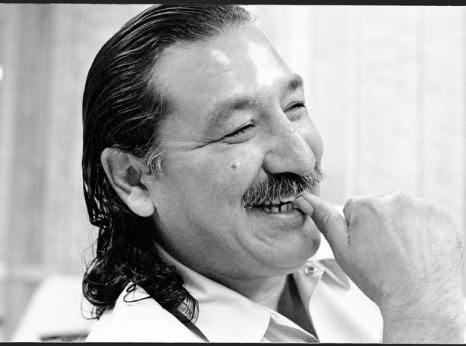US: Leonard Peltier, Seeking Clemency, Contracts Covid

Two US Supreme Court Justices noted in 2020 that in the context of the COVID-19 pandemic, “inmates everywhere have been rendered vulnerable and often powerless to protect themselves from harm”, and in January 2021 a federal judge in Washington, DC pointed out that “Among the most susceptible to the spread of COVID-19 is the prison inmate population”. Leonard Peltier is held in federal prison in Florida (US Penitentiary Coleman I). He has said that during the COVID-19 pandemic, prolonged lockdowns and lack of a vaccine booster have left him feeling severely isolated and anxious about his health. On 13 January 2022, his lawyers again wrote to the Warden of USP Coleman I to seek a recommendation for Leonard Peltier’s release, a request they said had assumed “heightened urgency” with the appearance and spread throughout the prison complex of COVID-19, which “carries potentially deadly consequences for someone of Mr. Peltier’s age and medical conditions”. L.eonard Peltier tested positive for COVID-19 on 28 January and was placed in quarantine for 10 days.
Leonard Peltier, an Anishinaabe-Lakota Native American, was a member of the American Indian Movement (AIM), which promotes Native American rights. On 26 June 1975, during a confrontation involving AIM members on the Pine Ridge Indian reservation in South Dakota, two FBI agents were shot dead. Leonard Peltier was convicted of their murders in 1977 and sentenced to two consecutive life sentences. Leonard Peltier has always denied killing the agents.
A key alleged eyewitness to the shootings was Myrtle Poor Bear, a Lakota Native woman. Her statement that she saw Leonard Peltier kill both FBI agents led to his extradition from Canada, where he had fled. However, Myrtle Poor Bear later retracted her statement. She was not called as a prosecution witness at trial, but the trial judge refused to allow the defence to call her as a witness on the grounds that her testimony “could be highly prejudicial to the government”. In 2000, Myrtle Poor Bear said that her original statement was the result of months of threats and harassment from FBI agents.
In 1980 documents were released to Leonard Peltier’s lawyers containing ballistics evidence which might have assisted his case, but which had been withheld by the prosecution at trial. However, in 1986, the US Court of Appeal for the Eighth Circuit denied a retrial, stating that: “We recognize that there is some evidence in this record of improper conduct on the part of some FBI agents, but we are reluctant to impute even further improprieties to them.”
Leonard Peltier is not eligible for another parole hearing until 2024. To date, the US Parole Commission has denied him parole on the grounds that he did not accept criminal responsibility for the two murders. This is despite the Commission acknowledging that “the prosecution has conceded the lack of any direct evidence that you personally participated in the executions of two FBI agents”. In a letter to President Biden in July 2021, James H. Reynolds, the US Attorney whose office handled the prosecution and appeal of Leonard Peltier, urged the President to commute the sentence of a man “I helped to put behind bars”. He said that Leonard Peltier’s “conviction and continued incarceration is a testament to a time and a system of justice that no longer has a place in our society”. He urged the President to “chart a different path in the history of the government’s relationship with its Native people through a show of mercy rather than continued indifference”.
Leonard Peltier has a variety of ailments, including kidney disease, Type 2 diabetes, high blood pressure, a heart condition, a degenerative joint disease, and constant shortness of breath and dizziness. A stroke in 1986 left him virtually blind in one eye. In January 2016, doctors diagnosed him with a life-threatening condition: a large and potentially fatal abdominal aortic aneurysm that could rupture at any time and would result in his death.
Leonard Peltier was denied clemency by President George W. Bush in January 2009, and by President Barack Obama in January 2017. His attorney filed a new clemency petition before President Joe Biden in July 2021. A decision is still pending. On 26 January 2022, the Chairperson of the Senate Indian Affairs Committee, Senator Brian Schatz, wrote to the President urging him to commute Leonard Peltier’s sentence, due to “(1) his old age and critical illness, (2) the amount of time he has already served, and (3) the unavailability of other remedies.” Senator Schatz commended the Biden administration’s “commitment to righting past wrongs in our criminal justice system” and urged commutation of Leonard Peltier’s sentence in keeping with this work for “a fair and constitutionally sound justice system”. In October 2021 eleven members of the US Congress called on President Biden to release him. In November 2021, Senator Patrick Leahy had also said that he supported Leonard Peltier’s release from prison.
In 2015, several Nobel Peace Prize winners—including the late Archbishop Desmond Tutu—called for Leonard Peltier’s release. The Standing Rock Sioux Tribe and the National Congress of American Indians have also called for his release. Due to the numerous issues at trial, the exhaustion of legal avenues for appeal, the amount of time he has already served, along with his chronic health issues, Amnesty International has long supported clemency for Leonard Peltier.